Control room contacts officer Emily Streeton. Image: Jess Hurd
“A woman comes home from work, the same time as the neighbour comes home. She sees the man go into his house and then sees him running out covered in blood, screaming, get in his car and drive off.”
Like many people who have seen tragedy on a regular basis, forensics expert Rob Birch relates this terrible tale of murder-suicide (the man had discovered his wife and their dead children) in a methodical, matter-of-fact way. But he betrays his emotion when he recalls his role on the scene, that day. In any case, there is a very particular point to his story.
Rob is, by profession, what the British call a scene of crime officer and the Americans, as made famous on television, a crime scene investigator. But these days he is full-time branch secretary of UNISON’s Staffordshire Police branch. Rob knows the police force inside out. And he’s using his old case to talk me through the dizzying range of roles – many thought to be the domain of the traditional police officer – that are in fact performed by police staff, the tens of thousands of unsung members of the UK’s police forces.
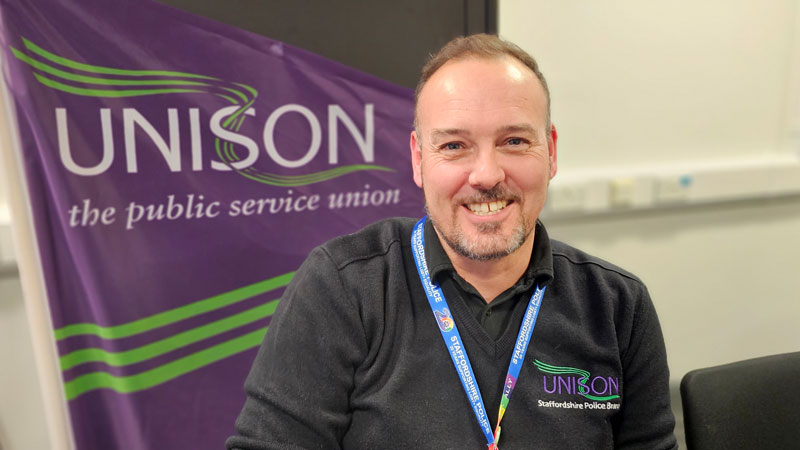
Staffordshire Police branch secretary Rob Birch.
“So, that neighbour’s 999 call comes into the control room,” he continues, “and it’s a call taker that takes it, dealing with somebody who’s absolutely distraught. That call taker is police staff. The scene of crime officers go to the address and do the forensic investigation. We had to deal with the dead children. We’re police staff. Investigative officers interview people – police staff. It gets to the major incident department, where typists type up all the statements – police staff. We have exhibits officers, they’re police staff. We have the justice team, who prepare all the paperwork, build a case – police staff.”
Of course, the investigation would have been headed up by a chief inspector, with police officers involved. But Rob is just touching the surface of police staff involvement. And this applies not just to murders and serious crime, but every kind of day-to-day incident, on the front line and behind the scenes.
As Ben Priestley, UNISON’s national officer for police and justice observes: “Police staff make up 40% of the police workforce and yet their contribution to policing has never been properly recognised. They work alongside police officers as 999 call takers, dispatchers, scenes of crime officers, investigators, police community support officers [PCSOs], custody and detention officers and hundreds of other specialist, technical, managerial and administrative functions, too numerous to mention.”
Unfortunately, he adds, “Police staff jobs are now under threat from the cumulative impact of years of police cuts.”
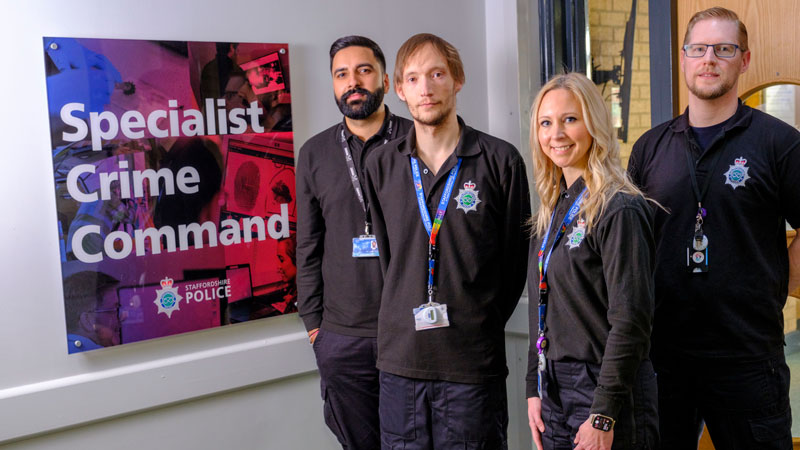
The digital forensics team. L-R: Digital forensic specialists Gurlabh Singh and Daniel Owen, digital forensic investigator Amanda Smith and digital forensics coordinator James Hart.
That’s why the Police Staff Week of Celebration and Recognition, starting today, is so important. It is the initiative of the Senior Police Staff Network, which was established two years ago and now numbers 1,500 senior police staff members, who aim to share experiences and knowledge, support personal development, and promote the importance of police staff as an invaluable part of the policing family.
Their focus is both internal and external – notably the public, many of whom have very little idea of how their police forces work beyond the traditional, all-purpose Bobby on the beat.
“I think the national narrative has always been around police officers,” says Rob. “So, when you hear on the news about cuts to policing, they always say there’s been this many police officers lost to policing since 2010. The government then decides to recruit more police officers.
“Politicians never talk about police staff. They never talk about the specialist roles that we do. And the public only really sees the narrative that’s on the media, what they see on the news, what they read in the newspapers, what they see on Question Time.
“But if a member of the public phones 999 or 101, they will not speak to a police officer. If they go into the police station – if there’s a front office that’s still open and hasn’t been closed now – they won’t speak to a police officer; that will be an inquiry officer, who’s police staff. Unless they happen to be on the street and see a Bobby on the beat, they will pretty much always be talking to a member of police staff.
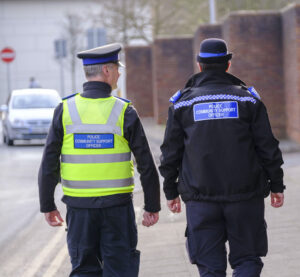
Police community support officers (PCSOs) are often confused with police constables on the beat.
“The issue with policing, for us, is primarily around funding and job security. Support staff are always the first ones to be cut when there are funding issues, because the narrative is we can’t do without police officers, and the public believe that.”
The government’s calculated focus on police officers – while trying to backtrack after years spent cutting police budgets – has twisted the organisation of police resources in a way that is affecting services and having a detrimental effect on all staff.
The Uplift programme of 2019 led to chief constables being ordered to recruit specific numbers of police officers, filling vacancies but, often, hiring more than they actually needed. The additional money provided for those officers was never enough – stretching already precarious budgets, and with police staff feeling the brunt.
Rob observes: “Very often they were saying, ‘Well, we can’t afford to employ police staff in the control room anymore. Therefore, what we will do is make them redundant, and stick these extra police officers in the control room, and they can answer the 999 calls.
“These officers are not on the streets anyway – so what’s the point? And, ultimately, they cost more money because their wages are higher than the police staff members who were doing the original job. But the chief constables’ hands are tied.”
And, he adds, these new police officers will not have the specialist training of the experienced police staff they are replacing.
Naomi Adusa-Addai: Recruiting and onboarding officer
Naomi Adusa-Addai is a recruiting and onboarding officer at Staffordshire, whose job it is to facilitate new staff into the organisation.
“My responsibilities influence the very fabric of policing, by ensuring a diverse and competent workforce… that reflects the communities it serves,” she says proudly.
“We are not only shaping the future of the police service, but also challenging preconceived notions about the makeup of law enforcement.
“It’s essential to convey to the public that police officers are just one piece of the puzzle; there are thousands of dedicated individuals like me, working tirelessly to support the broader mission.”
Two areas in which Staffordshire is currently under-resourced are the ‘intelligence hub’ and the police cells – involving jobs that people might assume are undertaken by PCs but are not.
“Custody is a case in point,’ says Rob. “In the custody department, you’ve got a custody sergeant who’s a police officer, who is basically in charge of that department. They’re responsible for the safety of the custody block, any legal decisions that need to be made. You then have police staff called custody detention officers.
“They are basically like prison officers. The custody detention officer has to take people’s fingerprints, take their photographs, they have to make sure that they are safe in their cell, that they’re not trying to kill themselves, they will have to search them for offensive weapons, drugs or anything like that. They will have to make sure they’re fed and watered, they will have to make sure that all their basic needs and their health care needs are met.
“If that person in the cell poses a suicide risk, there will be a custody detention officer who is assigned to that person to sit and watch them. They get spat at, they get kicked, they’re trained to restrain the prisoners if necessary.
“They are on the lowest pay grade we have in policing. They get paid less than the real living wage.”
Not surprisingly, he adds, “We have significant issues with recruiting to custody.”
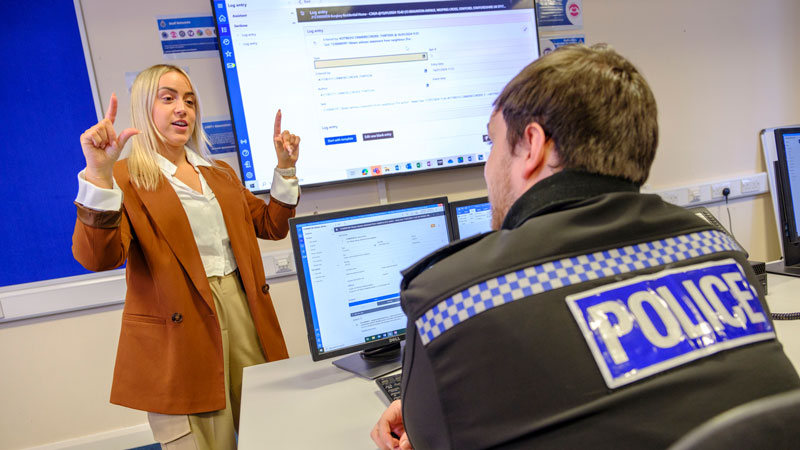
Kelly Hickson is a digital trainer developer, in learning and development – teaching other staff and officers how to use many of the IT systems that are essential to policing.
Another area of understaffing is that of information officers, who deal with various kinds of information gathering and analysis. Rob gives some examples.
“There’s a protest going on this weekend. We need to know what resources we need. The only way we can work out whether we need 20 police officers or 200 is by looking at who we think is going to attend. Are those people troublemakers or peaceful protesters? Are they going to be agent provocateurs, like the BNP, who go along to a Palestine protest just to try and cause trouble and to get it all heated up, so it looks bad on the news.
“The information officers look up all the information that we’ve got around that event. They’ll look at the stuff that’s going on social media that’s promoting the protests. They will do the research and try to work out where the flash points are going to be, and then predict what response we need to put in place.”
Then there might be a 999 call, from a woman whose violent ex-partner has abducted their young son. “The intelligence cell will get to work. What car does he drive? Where does he live? Where is he likely to go? They will work out where we need to direct the police officers to find this four-year-old child that has been abducted by his father.
“And they will deal with counterterrorism, reports from Crimestoppers, all this sort of stuff. They do so much work in the background that is completely unseen. And they are not police officers. They are specially trained.
“But we have significantly fewer staff in our operating model in intelligence than similar forces, who have similar demands on them, but with far more staff to cope with that. So our staff are constantly reporting stress, because they can’t get all this work done.”
And Staffordshire is far better placed than other forces.
The Uplift programme is now ended, but the budget crises remain. Police forces throughout England and Wales are currently experiencing huge deficits. Staffordshire’s current deficit is around £6m, which is modest compared to West Midlands Police’s £28m.
“At the moment I’ve had assurances from the Chief Constable that we’re not looking at imminent redundancies, in the same way as some of our neighbouring forces are,” Rob reports. “But, depending on what happens at the next elections, depending on future funding, we may be in that position in future.
“So, part of this week of celebration is around us making sure that people understand the consequences of these cuts, that there are all these other roles in the police force that are essential to policing and delivering safe communities, and that they will be destroyed if we see a lack of funding.”
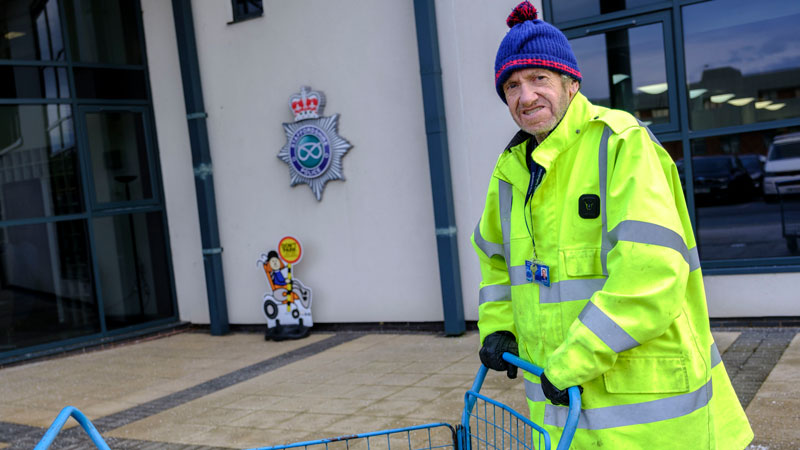
Nigel Pittard is a facilities assistant whose job is to keep Staffordshire HQ clean and tidy. He is one of the force’s longest serving employees, having started when he was 16.
Rob sees Police Week as a handy complement to UNISON’s recent campaigning films, We Are Police Staff, also aimed at raising the profile of police staff workers in England and Wales and Scotland. And it will offer a new recruitment and engagement opportunity for the branch, which hopes to operate a stall in the Staffordshire Police headquarters.
“If staff see there’s a threat to their roles and that we will do everything we can to fight that, then they will engage with us on that stall, and they’ll tell us what’s going on in their workplace.”
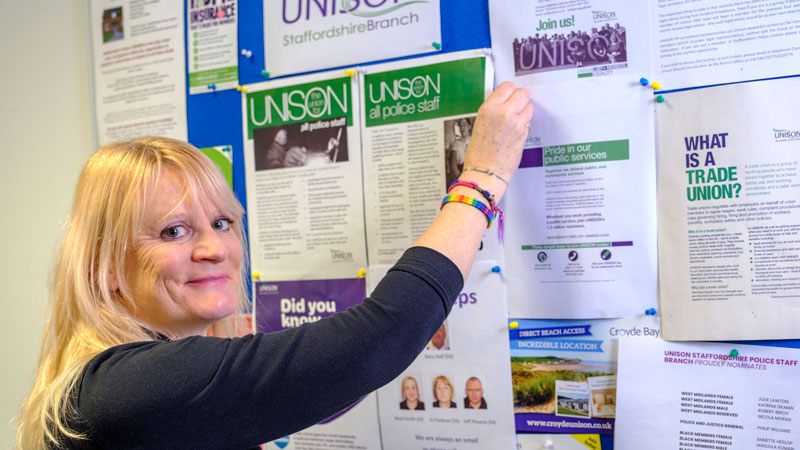
Assistant UNISON branch secretary Alison Sims.
Significantly, the week has the support of the National Police Chief’s Council. Rob intends to ask Staffordshire’s own communications team to promote it on its social media. “And I want to see our Police and Crime Commissioner putting something out, saying, ‘I commission services for policing in Staffordshire, and this is only delivered because there is a team of people working, including police staff.’ All PCCs should do the same, I think.”
Rob agrees that there’s some similarity in how police staff have been overlooked, with their fellow UNISON members in the health service.
“In many ways, when you think about the NHS, the narrative has always been about doctors and nurses. Sometimes porters will get a mention. But you don’t really talk about the radiographers, you don’t talk about the domestic staff, you don’t talk about the people who work in the kitchens providing the meals for the patients every day.
“Historically, all of those other people have always been ignored. Though, since COVID, we’ve had far more awareness of the NHS and the people who populate that workforce.
For police staff, there’s a long way to go. “The narrative needs to change,” he says, “in a big way.”
Images: Jess Hurd

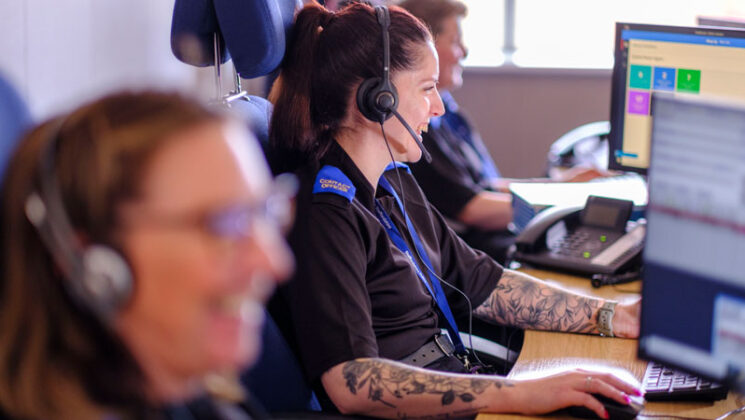

This is a timely reminder for all those staff in “support” roles in every area of public service. Without these vital staff those on the ‘front line’ would find it virtually impossible to carry out their roles. I work in a ‘support’ role in the NHS, my son is a Police Officer; he’s working at the sharp end of things and I’m in a ‘back office’ type of role but we’re both essential to the functioning of our respective organisations. People can and are highly critical of both our Police and the NHS, and it hurts me in my heart when that happens – especially if the criticism is justified and, unfortunately, it can be. I think we can all agree that both organisations are not perfect but they are essential to our society; where would we be without the rule of law and the ability to care for the sick and dying in our society? God bless all Police staff: support staff and officers alike – you are all a credit to this country so thank you for all that you do. God bless the NHS as well!
I read the full article and I must say you are absolutely spot on Police staff always gets over looked and never being mentioned,the latest I heard is they will not be recruiting anymore Police community support officers and we have to pick up the slack of the ones that retire.Pcso is always the first the public gets to meet but yet still no mention so totally agree with this article.
EXCELLENT
Well done to Unison for this, I 100% agree and support this.
Keep it up please.
Staffordshire Police MUST be the best trained force in the UK. Jeff Astle’s daughter was a Police training officer for years, with that force. (Astle of West Brom 1968 FA cup winners).
At Last !
The back story on what it takes to run the “Police Service”, that we all want to see keeping us all safe and active in our community’s…
I work in custody and can say we are the lowest of the low
Under manned under paid and shift pattern is unworkable
We recently been told since our shift was changed in 2021 we now all owe hours as pattern was wrong
2 yrs owed approximately 120 hrs each we being made to pay back no consultation to agree an outcome
Very few take rest breaks as to busy and understaffed
Confrontational but not rewarded for it
Shouted at spat at verbally abused and sometimes assaulted by detainees
More jobs being piled on us as they dispose of other roles within the force and get us to do their duties
Morale is low and goodwill gone
E mails sent out when things missed
Very rarely get praised by senior officers
Good thing abut the job I’m warm and dry and can work in all weathers
Unfortunately this government doesn’t seem to care enough about the NHS or the Police service…..
The police officers are given too much paperwork to do. The Government need to reduce pen pushing so that officers can get back on the beat. Also p.c.s.o’s DO NOT serve any purpose as they can not arrest anyone. This role needs to be abolished and p.c.s.o’s re deployed to where they can be utilised. Most people are unaware that the police officer’s themselves do not like p.c.s.o’s as they see them as a waste of resources as their role is not needed. More officers needed no p.c.s.o’s.
A very diverse Police Force with a range of talents.
For years Traffic wardens supported police officers in various ways not only parking offences, they were didbanded during the late 1990s , they were civilian support staff , i served as a police warden for 16 years and thoroughly enjoyed supporting the police , another service lost ,sad
It’s a great article and I’m glad that I’m a part of Unison and I’m glad that it exists to fight the staff corner. As a PCSO however, I’m done with Kent Police seniors now and am looking at possibly securing a more flexible, higher paid Job outside of the organisation. Sadly, we’re just numbers on a government spreadsheet and whilst the rich get richer and the ‘poorer’ get squeezed, they wont care. Don’t get me wrong, I’m blessed to have what I have and I’m certainly not lost on that. It’s just a real shame that when we talk about ethics or morality in the Police, it comes from a hollow place. Thanks Unison, keep up the energy because i’m lacking in it currently.